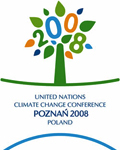1 December 2008: The UN Climate Change Conference opened in Poznan, Poland, on 1 December, bringing together around 11,000 participants from government, business and industry, environmental groups and research institutions.
The meeting includes the 14th Conference of the Parties (COP 14) to the UN Framework Convention on Climate Change (UNFCCC) and the fourth Conference of […]
 1 December 2008: The UN Climate Change Conference opened in Poznan, Poland, on 1 December, bringing together around 11,000 participants from government, business and industry, environmental groups and research institutions.
1 December 2008: The UN Climate Change Conference opened in Poznan, Poland, on 1 December, bringing together around 11,000 participants from government, business and industry, environmental groups and research institutions.
The meeting includes the 14th Conference of the Parties (COP 14) to the
UN Framework Convention on Climate Change (UNFCCC) and the fourth
Conference of the Parties serving as the Meeting of Parties to the
Kyoto Protocol (COP/MOP 4). In support of these two main bodies, four
subsidiary bodies will convene: the fourth session of the Ad Hoc
Working Group on Long-term Cooperative Action under the Convention
(AWGLCA 4); the resumed sixth session of the Ad Hoc Working Group on
Further Commitments for Annex I Parties under the Kyoto Protocol
(AWG-KP 6); and the 29th sessions of the Subsidiary Body for
Implementation (SBI 29) and Subsidiary Body for Scientific and
Technological Advice (SBSTA 29). A joint COP and COP/MOP high-level
segment with government ministers and other senior officials will also
take place from 11-12 December.
Delegates will deliberate on a wide range of topics and agenda items.
However, the primary focus will be on the post-2012 period, when the
Kyoto Protocol’s first commitment period expires. The negotiations in
Poznań are the halfway mark towards the December 2009 deadline for
agreeing on a framework for enhanced long-term global action against
climate change.
In an opening speech, Yvo de Boer, UNFCCC Executive Secretary,
underscored the need to achieve progress and lay a “solid foundation”
for an ambitious post-2012 climate regime. Noting the time pressure, he
urged delegates to focus on issues where an agreement could be reached
rather than on what divided them. He highlighted the particular
vulnerability of the poorest countries and emphasized the costs of
delaying action. De Boer then outlined recent achievements on ongoing
work and listed areas where progress had to be made in Poznan,
including: revising the CDM; fully operationalizing the Adaptation
Fund; and advancing work on methodological issues, policies and
incentives for reducing emissions from deforestation in developing
countries (REDD). He also drew attention to some problematic issues,
including: addressing delays regarding issues relating to national
communications from non-Annex I Parties; refining further the assembly
paper prepared by the AWGLCA Chair; and turning the discussion to
ranges of emission reductions for industrialized countries within the
AWGKP. Referring to the financial crisis, he called on delegates to
“increasingly focus on how the climate change regime could become
self-financing and to link climate change policies to economic
recovery.”
Also addressing delegates, Intergovernmental Panel on Climate Change
(IPCC) Chairman Rajendra Pachauri underlined that the Fourth Assessment
Report of the IPCC contains a wealth of information that still has
largely not received adequate attention. He provided some examples of
the impacts of climate change that would accrue as a result of
inaction, stressing the particular vulnerability of the poor. He
highlighted the 70% increase in greenhouse gas emissions between 1970
and 2004, despite the adoption of the UNFCCC in 1992. Pachauri
underscored that the cost of limiting the increase in global mean
temperature to about 2°C would be very modest and that the many
co-benefits from such action might outweigh this cost, but noted the
need to consider the impacts of climate change if such a stabilization
scenario is adopted. He urged delegates to “listen to and reflect on
the voice of science,” and “act with determination and a sense of
urgency.” [IISD RS coverage] [UN Press Release] [UNFCCC Executive Secretary’s Statement] [UNFCCC Press Release] [IPCC Chairman’s Statement]